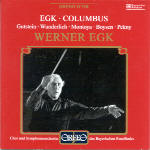As radio came into its own in Berlin during the late 1920s, composers discovered how this new medium might lend itself to new formal, expressive, and technological possibilities in the realm of musical theater. Not long after his arrival in Berlin, the Munich composer Werner Egk (1901-83) got in on the ground floor, so to speak, composing short radio scenes and children’s pieces involving singers, speakers, and instrumentalists. These projects lead to the commission in 1932 of an opera specifically conceived for radio based on the story of Christopher Columbus. At first hearing, the work seems stylistically akin to Stravinsky’s Oedipus Rex, with its use of speaking narrator and punchy orchestration. Yet Carl Orff’s boldfaced, declamatory aesthetic permeates Egk’s vocal writing, particularly in his use of a unison chorus. Egk also likes to generate dramatic momentum by repeating asymmetrical rhythmic figures, as in scenes like the crew’s recruitment at the end of the first act.
Fritz Wunderlich’s gloriously spun tenor voice brings King Ferdinand’s music to life, highlighted by a soaring duet with Lia Montoya, the Isabella, at the start of Act 3. Her secure, slightly breathy voice ably commands the role’s daunting tessitura. Ernst Gutstein does just as fine in the title role, but is the dryness in his lower range a factor of voice or studio acoustics? As is often the case with radio recordings, voices dominate in the mix. To all these add the composer’s authoritative podium presence. The libretto is in German only, but an English synopsis with banding cues is included. Worth hearing.
































